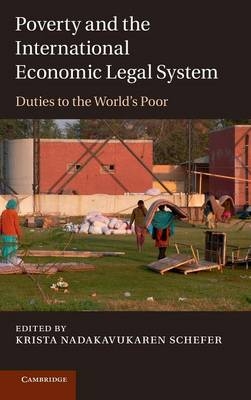
Poverty and the International Economic Legal System
Cambridge University Press (Verlag)
978-1-107-03274-3 (ISBN)
With a focus on how trade, foreign investment, commercial arbitration and financial regulation rules affect impoverished individuals, Poverty and the International Economic Legal System examines the relationship between the legal rules of the international economic law system and states' obligations to reduce poverty. The contributors include leading practitioners, practice-oriented scholars and legal theorists, who discuss the human aspects of global economic activity without resorting to either overly dogmatic human rights approaches or technocratic economic views. The essays extend beyond development discussions by encouraging further efforts to study, improve and develop legal mechanisms for the benefit of the world's poor and challenging traditionally de-personified legal areas to engage with their real-world impacts.
Krista Nadakavukaren Schefer holds a Swiss National Research Foundation Professorship at the University of Basel Law School, where she teaches international economic law. She also teaches at the World Trade Institute, University of Bern.
Part I. Poverty and International Law: Setting out the Framework: 1. Poverty, obligations and the international economic legal system: what are our duties to the global poor? Krista Nadakavukaren Schefer; 2. Anti-poverty v. the international economic legal order? A legal cultural critique Colin B. Picker; Part II. IEL Institutions and Poverty: Part IIA. Trade: 3. Introductory note: trade and poverty Gabrielle Marceau; 4. Poverty, redistribution and international trade regulation Thomas Cottier; 5. Trade liberalisation and poverty reduction: complementary or contradictory aims? Bryan Mercurio; 6. God, the WTO and hunger Christian Häberli; 7. Does free trade matter for poverty reduction? The case of ASEAN Pasha Hsieh; 8. Poverty alleviation through paperless trade Emmanuel Laryea; Part IIB. Investment and Arbitration: 9. Arbitration, insurance, investment, corruption, and poverty: introduction J. J. Gass; 10. Foreign direct investment and the alleviation of poverty: is investment arbitration falling short of its goals? Mariel Dimsey; 11. The 'corruption objection' to jurisdiction in investment arbitration: does it really protect the poor? Stephan Wilske and Willa Obel; 12. Investment guarantees and international obligations to reduce poverty: a human rights perspective Markus Krajewski; 13. International commercial arbitration and poverty: not obvious but (maybe) possible Christopher Kee; 14. Access to justice in dispute resolution: financial assistance in international arbitration Brooks W. Daly and Sarah Melikian; 15. From problem to potential: the need to go beyond investor-state disputes and integrate civil society, investors and state at the local level Mariana Hernandez Crespo; 16. The Millennium Challenge Corporation, law, and poverty reduction Stuart Kerr; Part IIC. International Financial Regulation: 17. Reflections on law and poverty Gavin Bingham; 18. Ambitious goals, limited tools? The IMF and poverty reduction Ben Thirkell-White; 19. The direct contribution of the international financial system to global poverty Ross P. Buckley; 20. The World Bank: fighting poverty: ideology versus accountability Mark S. Ellis; 21. Life, debt and human rights: contextualising the international regime for sovereign debt relief Celine Tan; 22. Sovereign debt, odious debt and the poverty of nations Yvonne Wong; 23. Poverty and corruption Mark Pieth; Part III. IEL and Poverty: Concerns of Particularly Vulnerable Populations: 24. International economic law, women and poverty Barnali Choudhury; 25. The book famine: international copyright rules as barriers to knowledge for impoverished persons with disabilities Caroline Hess-Klein; 26. Caring for its children!: How the European Union uses free movement law to tackle child poverty and social exclusion Aline Doussin; Part IV. Challenging Our Assumptions: Is there a Duty to Reduce Poverty?: 27. Introduction Stephanie B. Leinhardt and Krista Nadakavukaren Schefer; 28. Human rights obligations of the poor Monica Hakimi; 29. The allocation of anti-poverty rights duties: our rights, but whose duties? Samantha Besson; Part V. Conclusions: 30. Closing thoughts Krista Nadakavukaren Schefer.
| Zusatzinfo | 1 Halftones, unspecified |
|---|---|
| Verlagsort | Cambridge |
| Sprache | englisch |
| Maße | 150 x 231 mm |
| Gewicht | 830 g |
| Themenwelt | Recht / Steuern ► EU / Internationales Recht |
| Wirtschaft ► Volkswirtschaftslehre ► Makroökonomie | |
| ISBN-10 | 1-107-03274-1 / 1107032741 |
| ISBN-13 | 978-1-107-03274-3 / 9781107032743 |
| Zustand | Neuware |
| Haben Sie eine Frage zum Produkt? |
aus dem Bereich


